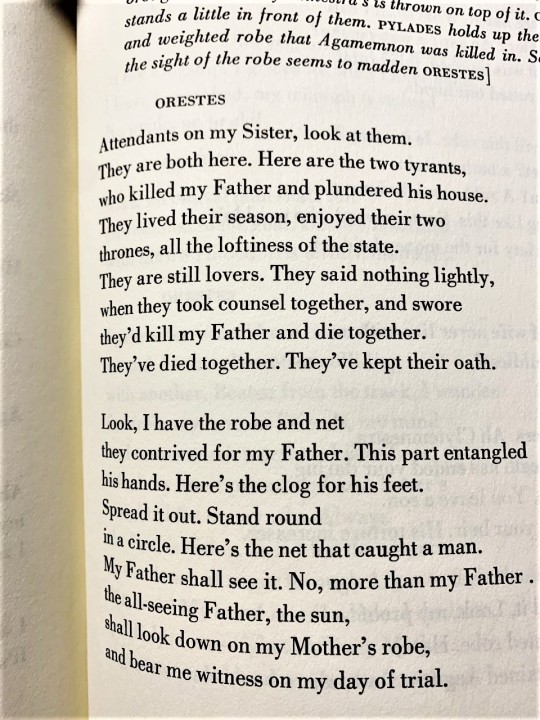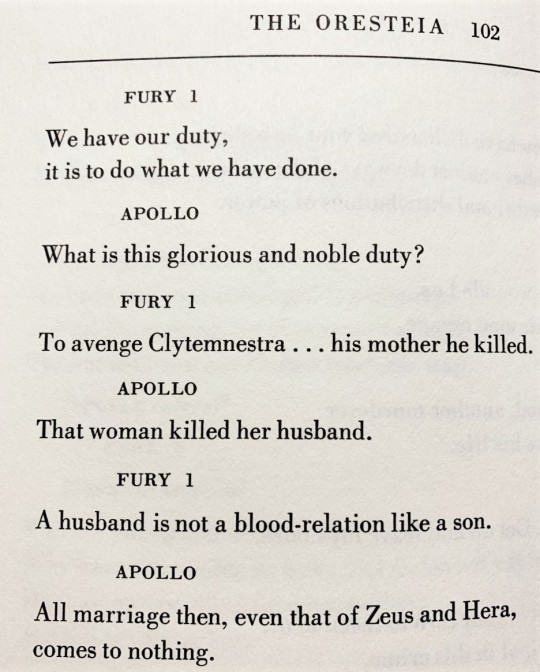#greek drama
Explore tagged Tumblr posts
Text


"Dionysus is a god, a god of transformation. To be in his presence is to lose oneself, to become one with the primal forces of nature."
― Euripides, The Bacchae
Painting: "The Bacchanal of the Andrians" by Tizian
#albert camus#poetry#sylvia plath#classical quotes#literature#booklr#franz kafka#quotes#classics#classical literature#the secret history#the secret history aesthetic#donna tartt#dionysus#greek literature#greek mythology#greek tumblr#greek gods#greek drama#euripides#the bacchae#classic literature#literary quotes#renaissance#renaissance art#tizian#rafael#words words words#spilled words#dark acamedia
127 notes
·
View notes
Text



Do as you please, Live, by all means! The laws you will break are not of man's making
#antigone#antigone 2012#jodie whittaker#theatreedit#national theatre#national theatre live#nt live#greek drama#sophocles#antigone posting#char.gif#if youre seeing this again its cuz my old acc got obliterated saur
231 notes
·
View notes
Text

Thorin Oakenshield can be considered a tragic character.
Analyzing Thorin Oakenshield as a tragic character through the lens of Greek tragedy provides a deeper understanding of his narrative arc and character development. Here’s a detailed analysis based on the principles of Greek tragedy:
Characteristics of Greek Tragedy

Noble Stature:
Greek tragedies typically feature protagonists of noble birth or high status.
Thorin's Noble Stature: Thorin is the rightful heir to the throne of Erebor, which establishes his noble lineage and royal status.
Hamartia (Tragic Flaw):
A tragic hero possesses a flaw or makes a mistake that leads to their downfall.
Thorin's Hamartia: Thorin's tragic flaw is his overwhelming greed and obsession with reclaiming the treasure of Erebor, particularly the Arkenstone. This greed blinds him to reason and leads to irrational decisions and conflicts.
Hubris (Excessive Pride):
Many Greek tragic heroes exhibit hubris, an excessive pride that often leads to their downfall.
Thorin's Hubris: Thorin's pride in his lineage and destiny to reclaim Erebor contributes to his downfall. His refusal to share the treasure and his stubbornness in negotiations with other parties reflect this hubris.
Peripeteia (Reversal of Fortune):
The hero's fortunes change dramatically, usually from good to bad.
Thorin's Peripeteia: Thorin's initial success in reclaiming Erebor turns sour as his greed alienates allies, causes internal strife, and leads to the siege of the Lonely Mountain. His fall from a respected leader to a paranoid and isolated figure marks this reversal.

Anagnorisis (Recognition):
The hero realizes their flaw or the true nature of their situation, often too late to avoid the consequences.
Thorin's Anagnorisis: Thorin experiences a moment of clarity on his deathbed, recognizing the destructive power of his greed and seeking reconciliation with Bilbo and others he wronged.
Catharsis:
The audience experiences a purging of emotions, particularly pity and fear, through the hero’s journey.
Catharsis in Thorin's Story: Thorin's tragic arc elicits pity for his internal struggle and ultimate downfall, and fear of the destructive nature of unchecked greed and pride. His redemption at the end provides a bittersweet closure.

#the hobbit#thorin#richard armitage#thorin oakenshield#character analysis#tragedy#greek drama#from a scenographer's view and a drama theory#i love analyzing characters and reveal their theatrical features#Thorin is a tragic character#i would see him in as a role in greek tragedy by Aeschylus or Euripides
54 notes
·
View notes
Text
There’s something to be said about that one scene in Euripides Andromeda, where Perseus sees Andromeda from a distance thinking she’s a beautiful statue, only to come closer and realize she’s flesh and blood. I’ve been thinking about that scene again, it made me realize that metaphorically, when Perseus first sees her, he realizes that Andromeda is a person, not an object or prize. Which comes in stark contrast to how other ppl in her life view her, even within the play (at least depending on how you interpret the fragments).
Cepheus viewed her as a political tool, to marry her off to whoever he wanted, Cassiopeia viewed her as a status symbol, to flaunt her around like she’s a priceless treasure, Phineus saw her as a means for power, as nothing more than a bride, hell even the ppl of her country didn’t see her as a person and pressured Cepheus into sacrificing her. Perseus might have been the first to see her as a person.
Knowing Euripides this was definitely intentional, after all it’s straight up a romantic drama. So it’s especially disheartening… when I see ppl claim that Perseus only saw Andromeda as a prize… as if he wouldn’t fight for her still regardless of whether her father would let them marry, as if he straight up didn’t demand that the god of love himself help him rescue the woman he just met.
#Perseus set a new standard for romance but y’all not ready for that#greek mythology#ancient greek mythology#greek pantheon#perseus#andromeda#Perseus and andromeda#Persomeda#Cepheus#cassiopeia#Phineus#Euripides#princess andromeda#greek drama#greek theatre#Greek theater
35 notes
·
View notes
Text




faith in your oaths is gone, and I know not whether you believe the gods yet rule or if new laws have been established for mortals since you know you've broken your oath to me. —Euripides, Medea
#traduttore traditore#ancient greek#greek drama#euripides#medea#greek tragedy#classic academia#classical studies#classics#grey academia#dark academia#dark acadamia aesthetic#books#bibliophilia#ἐποίησα
24 notes
·
View notes
Text
Recently Viewed: Medea (1969)
[The following review contains SPOILERS; YOU HAVE BEEN WARNED!]
There is a centaur in Pier Paolo Pasolini’s Medea.
Not a literal centaur, mind you; as the mythological creature explicitly admits, he’s merely a metaphor. Over the course of the narrative, he manifests in two distinct forms: first as the traditional half-horse, then later as an ordinary human being. These contradictory shapes symbolize the story’s central conflict: the tension between (respectively) faith and rationality.

The latter philosophy is perfectly personified by the male lead, Jason. The quintessential classical hero—a term with significantly different connotations in the context of antiquity—the legendary captain of the Argo refuses to accept the notion that his path has been preordained by forces beyond his comprehension, preferring instead to believe in an entirely material world governed solely by self-determination. His knowledge of the universe extends no further than what he can physically touch: the territories that he conquers, the loot that he plunders, the women that he seduces and exploits. And in his insatiable pursuit of wealth and power, he is willing to break any oath, vow, or pact—no matter how sacred.
This arrogance costs him dearly.
His titular tragic lover (and the movie’s true protagonist), on the other hand, is unwaveringly pious. Revered as a high priestess in her native country of Colchis and feared as a pagan sorceress by the Greeks, Medea recognizes the presence of spirits and deities in every nook and cranny of nature: in the gentle caress of the midday sun, in the searing heat of ceremonial flames, in the warmth of the sacrificial blood with which her people anoint their crops to encourage a fruitful harvest. Consequently, she is also an ardent fatalist. Although she frequently experiences prophetic visions of the future, she makes no effort to avert the misfortunes that they portend; indeed, she’ll obediently follow a premonition of doom even to its bitterest conclusion—for such is the will of the gods and the destiny of all mortals.

This dogmatic zealotry has equally disastrous repercussions.
Shot with the unpolished immediacy of an ethnographic documentary (a stylistic choice that clashes beautifully with the otherwise fantastical plot) and featuring a culturally/temporally ambiguous setting that emphasizes the ancient source material’s universal themes (albeit not quite to the same degree as Pasolini’s own adaptation of Oedipus Rex), Medea is a brilliantly unconventional and thoroughly modern interpretation of the works of Apollonius of Rhodes and Euripides—as clear in its artistic ambitions as it is unclassifiable in its execution.
And there's a freakin' centaur in it; what a picture!
#Medea#Pier Paolo Pasolini#Euripides#Maria Callas#Italian film#Italian cinema#Greek mythology#Greek tragedy#Greek drama#Criterion Collection#Criterion Channel#Criterion#film#writing#movie review
8 notes
·
View notes
Text

'This is the last time I shall see the sun - so round, so glorious. This is my last goodbye to you, my own dear mother. Now I am going into the dark.'
Polyxena in 'Hecabe' by Euripides (trans. Philip Vellacott).
56 notes
·
View notes
Note
Hi! It's me again!
I wanted to ask, what are your favourite greek tragedies/comedies/texts and authors? In your analysis I see you mention a lot of them (Euripides and Ovid being some exemples), so I was curious to know more ^^
Oh that is a very good question! I guess it depends on the charcter represented in the tragedies. All writers seem to have good and bad traits there. For example I love Eurypedes's cretivity and the way he handles human emotions and I definitely love his writing in regards on some characters but his obsession of villainizing some characters (particularly Odysseus) makes me tick a bit! Hahahaha! Aeschylus is also a very sensitive writer and has some amazing works in his portfolio. And he is one of the few that speak for the Seven Against Thebes. Sophocles is also amazing and much sensitive and careful with what he writes etc
I should say out of the Greek writers I do love Sophocles for his depictions of homeric characters, especially Odysseus in many cases (like "Ajax" or "Philoctetes"). I love the writing on Eurypedes when he focuses on the "background characters" such as the women of Troy and the tragedies of war and the consequences of them From roman times I am not so familiar with theater but epic poetry is also flourishing and so I do like people like Statius who touch subjects of the epic cycle such as Achillis and Thebais) etc
So I enjoy really much "Helen" by Eurypedes, he uses creative liberties to create his story. By Sophocles honest I love most of his work. "Ajax" and "Philoctetes" are amazing balancing comedy and tragedy suffering and forgiveness, "Antigone" as famously one of the most known passages that every Greek kid knows (Ironically from a comedy series! XD) etc
Now from Comedy of course the old master is Aristophanes. He is just pure satire of everything that goes on around him. He is also famous for his foul mouth and cussing words in his comedies. One must look at "Ploutos" ("Wealth") to know where mortals give a blind god back his light! Like the dude was unhinged with society!
3 notes
·
View notes
Text
just had the closing night of my 6th form's production of Bakkhai and am devastated i can't live on reacting to things like a bacchic woman. What Do You Mean i can't drum on the floor or hum ominously or give random people crazy eyes or kill a man in my daily life??? devastating
4 notes
·
View notes
Text
youtube
The Temple of Artemis (250 AD) Ambient Music
#the temple of artemis#artemis#temple#greek mythology#greek gods#greek tumblr#ancient greek#ancient greece#greece#greek art#greek aesthetic#greek architecture#greek quotes#greek epic#greek rp#greek religion#greek tragedy#greek theatre#greek underworld#greek inspired#greek pantheon#greek philosophy#greek paganism#greek sculpture#greek songs#greek style#greek deity#greek drama#greek film#greek history
6 notes
·
View notes
Text
"Now lie down on your bed, And if these terrors come to scare you from your rest, Try to ignore them; just stay there and keep quite still. Such sickness, even when more imaginary than real, Still racks the sufferer with anguish and despair."
Euripides, Orestes
#Euripides#Orestes#night terrors#nightmares#sleep paralysis#dreams#spooky season#Greek drama#tragedy#tragedy quotes#drama#drama quotes#Greek mythology#Ancient Greek literature#quotes#quotes blog#literary quotes#literature quotes#literature#book quotes#books#words#text
2 notes
·
View notes
Text
Merry fucking Christmas to Ismene and Creon. Can you imagine how fucking rancid the vibes are between those two?? You're entire collective family is dead and your stuck with the one person you've barely ever thought about from the whole dynamic
#whos gonna write that play and why is it gonna be me#itd be self indulgent and Bad and So Depressing#classics#antigone#theater#oedipus rex#greek drama#greek tragedy#mythos#char.txt#antigone posting
42 notes
·
View notes
Photo





Justice, the Court System, and Drama in Athens
After ousting of the last tyrant of Athens, Hippias, in 510 BCE, and establishing Athenian Democracy, several new departments of governance needed to be created. One of the most crucial was that which presided over justice. Up to this point in Greek history, justice was the responsibility of the wronged party’s family. This commonly meant that if someone were killed, the victim's family would need to track down the murderer and kill them in return. This often resulted in a cycle of revenge with rival families, continuously thinning each other down to the point of non-existence. Given that such feuds tend to weaken a state rather than strengthen it, the Athenian government sought to take justice into the state's hands, thus leading to the establishment of the Athenian court.
This style of delivering justice had never been seen in the Greek world up to this point. The mythical origin of this system is reflected in Athenian playwright Aeschylus’s Oresteia, the only known surviving trilogy of dramas from the ancient Greek world. One of Special Collections’ several editions of these plays (our oldest is a Parisian printing in Greek published in 1552) is this one translated by the noted American poet Robert Lowell and published by Farrar, Straus, Giroux in 1978.
The story of the Oresteia is broken down into three plays, Agamemnon, The Libation Bearers, and The Eumenides. Agamemnon tells of the murder of Agamemnon, King of Mycenae, by his wife Clytemnestra after his return from the ten-year Trojan War. The Libation Bearers relates how Agamemnon’s son Orestes returns years after his father’s murder to seek revenge against Clytemnestra on Apollo’s orders, but after killing her becomes the target of the Furies' merciless wrath. The Eumenides illustrates how the sequence of events in the trilogy ends up in the development of social order or a proper judicial system in Athenian society with Athena setting up a trial in Athens for Orestes, the first courtroom trial. Orestes is acquitted, which the Furies reluctantly accept, leading Athena to rename them the Eumenides, “The Gracious Ones.” Athena then proclaims that all trials must henceforth be settled in court rather than being carried out personally.
From this series of plays, Aeschylus was able to demonstrate his belief in how integral the Athenian justice system was to maintaining the strength and stability of Athens, rather than being subject to the whims of familial vengeance cycles.
View more of my Classics posts.
– LauraJean, Special Collections Undergraduate Classics Intern
#Classics#greek history#Greek drama#Greek plays#Aeschylus#Oresteia#Agamemnon#The Libation Bearers#Eumenides#Robert Lowell#Farrar Straus Giroux#Greek courts#Greek trials#Greek justice#Ancient Greece#LauraJean
32 notes
·
View notes
Text

The Warriors (1979)
Director: Walter Hill
44 notes
·
View notes
Text
Remembering the time I enjoyed my univerity's performance of "Lysistrata" so much that I brought my sisters to see it too. I told them that we shouldn't sit too close to the front so we wouldn't get wrangled into audience participation, as my boyfriend and I had done the other night. My little sister kinda scoffed, "I didn't know you were bringing us to a children's play"
And then the inflatable erections came
#came running down the aisle i mean lol#attached to suffering soldiers wearing short skirts#lysistrata#ancient greece#greek drama#greek theatre
4 notes
·
View notes
Text
Rip Trimalchio you would've loved keeping up with the Kardashians
#Trimalchio#dinner with trimalchio#Trimalchio's dinner#Cena Trimalchionis#petronius#satyricon#classics memes#classics#ancient rome#roman mythology#greek drama#noveau riche#kim kardashian#Kardashians#keeping up with the kardashians#geordie shore
4 notes
·
View notes